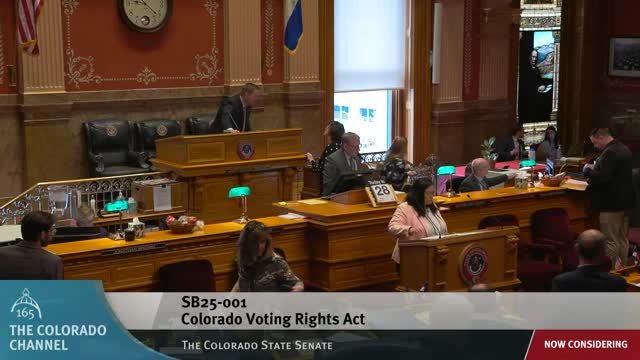Senate adopts Colorado Voting Rights Act after series of amendments tightening remedies and multilingual rules
Get AI-powered insights, summaries, and transcripts
Subscribe
Summary
After hours of debate and multiple amendments, the Senate passed Senate Bill 1, the Colorado Voting Rights Act, adding new procedural rules for complaints, multilingual ballot provisions and remedies for alleged violations of statewide election law.
Senate Bill 1, dubbed the Colorado Voting Rights Act, passed the Senate on March 28 after the chamber adopted several sponsor-led amendments that set procedures for complaints, clarified multilingual ballot requirements and adjusted venue and remedy language for election-related suits.
The bill’s sponsor, Senator Sandra Gonzales, moved the measure with committee reports and offered three clarifying amendments she said were designed to address concerns raised by county clerks, municipalities and tribal governments. “L20 clarifies precinct-level data submission and accommodations for institutions that house people with disabilities,” Senator Gonzales said on the floor. “L21 creates an exemption for municipalities under 3,000 people for multilingual ballot requirements and clarifies coordination between counties and municipalities. L22 addresses remedies and venue so that matters of statewide concern engage the Secretary of State early on.”
The nut graf: The bill, as amended, aims to modernize election administration by improving data sharing, expanding multilingual ballot access in areas with need, and creating a process for complaints that involves the Secretary of State and limits where parties may sue. Proponents said the changes respond to county clerks’ concerns and ensure consistent statewide administration of Title 1 election law; opponents pressed questions about separation of powers and court authority to grant requested remedies.
In floor debate, Minority Leader Lundy and other Republicans asked whether the remedies language would improperly shift legislative authority to district courts. “It seems to me we are putting courts in a situation where they are becoming activists in nature, attaching authority that is legislative in nature,” Lundy said during discussion of amendment L22. Senator Gonzales responded that the intent is to provide a neutral venue (Denver District Court) for statewide issues, ensure the state is a necessary party when statewide implementation is implicated, and to give the Secretary of State early notice of complaints.
Other amendments that passed with the bill addressed multilingual ballots and small-municipality exemptions (L21), data reporting (L20), and the process for notification, settlement and scope of remedies (L22). The floor also considered a later set of amendments and technical changes adopted in the committee of the whole prior to final passage.
The bill instructs counties and municipalities to coordinate on multilingual ballot translation when they hold joint elections, exempts municipalities with fewer than 3,000 residents from certain multilingual requirements, and requires certain election data be submitted at the most granular level available. It also clarifies when the Secretary of State must be notified and when the state is a necessary party in litigation alleging statewide implementation problems.
Senate action: The Senate adopted the sponsor’s amendments on the floor (including L20, L21 and L22) and later passed the bill. The committee-of-the-whole later reported related technical changes back to the Senate prior to final passage. The measure as amended was adopted by the Senate and ordered engrossed and placed on the calendar for final passage.
The bill will proceed to the next stage of the legislative process with the amendments adopted on March 28; supporters said the text reflects many compromises between clerks, municipal officials and the sponsor, while critics signaled they may press additional changes in the next chamber.
